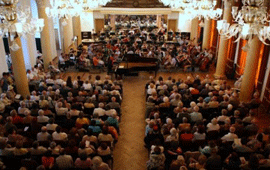> [Archived] Interviews

The 'Coronensis' Music Festival in Brasov
Between October 11th to 16th, 2011, it was held in Brasov the ninth Coronensis Music Festival, organized by the Evangelical Church parish in Brasov and the German Embassy in Bucharest. This year is always a celebration of the 150th anniversary of the birth of composer Rudolf Lassel from Brasov and it includes three chamber concerts, one symphonic concert, an organ concert in the matinee and a festive concert for choir and organ. Among the inedited proposals that have been prepared for the Brasov audience was the concert of an orchestra of 12 cellos of the Redoubt Hall and premiered the piece of George Enescu's Hommage signed by Gabriel Mălăncioiu.
I found out more details from an interview with the festival's artistic director, organist Schlandt Steffen.
The 2011 edition of the 'Coronensis Music' Festival celebrates 150 years since the birth of Rudolf Lassel. What is the importance of this musician for your city?
Why did you chose to celebrate this anniversary during this festival?
Lassel Rudolf's music will be present in several concerts - the first day of the Festival there will be played the first part of a string quartet. His work will also be present in the final concert of the Festival, which takes place at the Black Church, titled 'A dialogue between Felix Mendelssohn, Rudolf Lassel and Gheorghe Dima'. There will be interpreted works for organ and choral works, in order to highlight the relationship between these three composers who had as common element the city of Leipzig. A milestone in the Festival is also the unveiling of the commemorative plaque 'Rudolf Lassel' in the churchyard.
Can you provide us a few details about the novelty of this edition?
The theme of this year would be 'Guests in Brasov'. We invited many bands of the country - from Bucharest, Sibiu, Cluj, Timisoara - and a Polish organist to play Brasov music and to take this music further in their cities.
Tuesday, October 11, you launch a compact disk and a volume entitled 'Saxon Songs of the Barsa Land .' Can you describe in a few words the content and sources of these materials?
This CD was designed to commemorate 800 years since the first historical record of the Barsa Land. The idea was to learn one song from each village where the Saxons lived. Luckily we found in every village one song - whether it was written, whether we had to learn it after listening to it - and thus there gathered the 16 regional songs, plus 14 representative songs for the Barsa Land. We have thereby a total of over 30 pieces in Saxon or German language, which have in common the Barsa Land.
Translated by Iulia Florescu
MTTLC, Bucharest University














